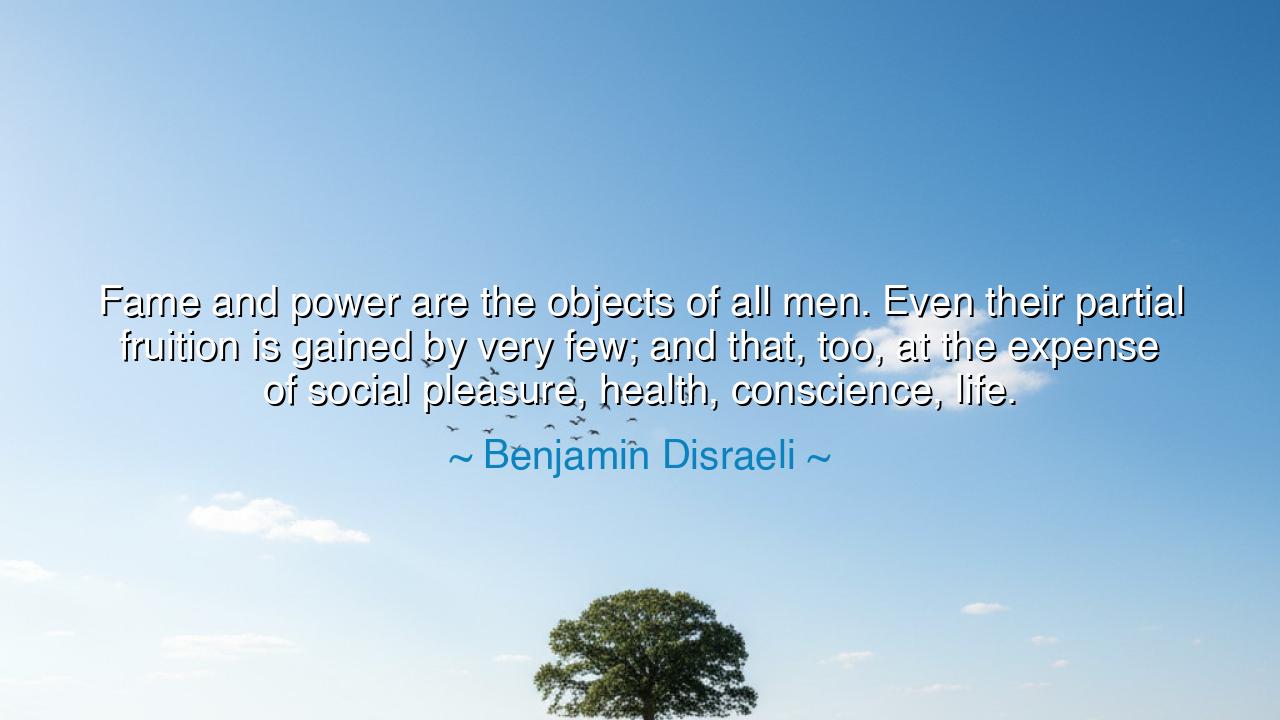
Fame and power are the objects of all men. Even their partial
Fame and power are the objects of all men. Even their partial fruition is gained by very few; and that, too, at the expense of social pleasure, health, conscience, life.






In the twilight of empires and the clamor of ambition, Benjamin Disraeli, a man of both wit and wisdom, once declared: “Fame and power are the objects of all men. Even their partial fruition is gained by very few; and that, too, at the expense of social pleasure, health, conscience, life.” His words rise from the heart of experience, spoken by one who had climbed the perilous ladder of politics and gazed from its summit upon the fleeting glory below. For Disraeli knew what few dared admit — that ambition, though a mighty flame, consumes the vessel that bears it.
To understand this truth, one must see how deeply the hunger for fame and power has been carved into the human soul. From the ancient kings of Babylon to the captains of industry in our own time, men and women alike have sought to rise above the multitude, to carve their names into the marble of memory. Yet what is fame but a whisper carried by the wind, and what is power but a crown of thorns gilded in illusion? The multitude dreams of it, believing it to be joy’s reward, but those who attain it often discover that they have traded their peace for applause, their health for sleepless striving, their conscience for victory’s hollow taste.
Look upon the tale of Alexander the Great, who at thirty years of age had conquered the known world. He stood amid the ruins of Persia and wept, for there were no more worlds to conquer. The fires of his ambition had devoured all that could sustain them — and soon, his body followed, consumed by fever, perhaps by fate. He gained the fame and power that all men desire, yet he lost what Disraeli called the true treasures: the pleasures of the soul, the warmth of friendship, the quiet joy of a life at peace with itself. His story is the mirror of every great conqueror’s curse — that to rule others, one must first lose mastery of oneself.
And yet, Disraeli did not speak in bitterness. He, too, was a man of ambition — a statesman who rose from ridicule to rule an empire. But in his later years, he saw clearly what his youth had concealed: that every triumph extracts a toll. For each moment in the sun, a shadow must be paid. Social pleasure withers in the long hours of labor; health falters beneath the burden of command; conscience is tested by the compromises of necessity. Even life itself — the breath and spark of being — is spent like coin in pursuit of glory. The wise, therefore, must ask: is the purchase worth the price?
There is a gentler wisdom that flows beneath Disraeli’s warning — a call to remember that greatness need not be loud, nor achievement cruel. Fame that endures is not the echo of a name, but the legacy of a deed done in truth. The power that ennobles is not dominion over others, but mastery over desire. To chase the applause of men is to become their servant; to serve the quiet voice of one’s own conscience is to become free. Thus, the ancient sages taught that contentment is the crown of the wise, and humility the throne of peace.
Consider the story of Marcus Aurelius, the Roman emperor who ruled the mightiest empire of his time, yet wrote each night in his journals as a man weary of power’s illusions. “Do not waste the remainder of your life,” he wrote, “imagining what your neighbors say or think of you.” Though surrounded by wealth and reverence, he sought refuge not in conquest, but in clarity — in the understanding that fame fades, and only virtue remains. Like Disraeli, he saw that the truest kingdom is within, and the mightiest victory is over the restless longing of the heart.
So, my listener, remember this: Seek not the glory that blinds, but the purpose that endures. Let your deeds shine not because the world applauds, but because they are good and just. Guard your health, for it is the vessel of the spirit. Keep your conscience, for it is the compass that no title can replace. Cherish companionship, for the laughter of friends is worth more than the roar of crowds. And above all, live not for fame, but for truth, for truth alone stands unshaken when the echoes of applause have died.
For when the day comes that the world forgets your name — as it surely will — what will remain is not the power you held, nor the titles you bore, but the peace of a life well-lived. That is the wisdom of Disraeli’s words: that true greatness is not to be admired, but to be whole; not to be envied, but to be at peace. So walk humbly, work earnestly, love deeply — and you shall know a glory that no throne can grant and no time can take away.






AAdministratorAdministrator
Welcome, honored guests. Please leave a comment, we will respond soon